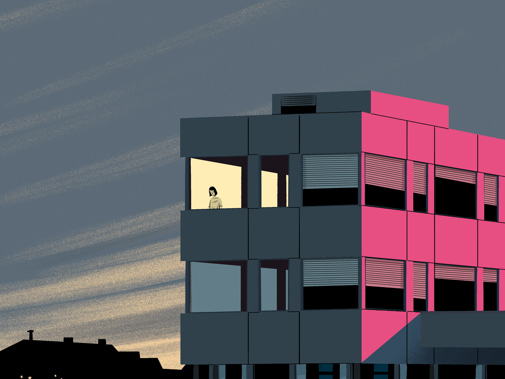The sky across the city is dimming down for dusk as I look out from the labour-ward window.
I knock on the door to the private room, standing in my anaesthetic greens. I feel the plastic mould of my clogs momentarily ground me, static to the floor.
I walk in towards the bed as the midwife nods towards the mother. I see the beauty of the last days of pregnancy in the bloom on her face, the Rubenesque bulge of her tummy with child.
Then I look in her and the father’s eyes and see the raw, red swelling of tears spent. She is looking at me but through me, blunt and desperate.
I sit on the mint-green NHS bedspread and look in her eyes.
‘I am so sorry…’ I introduce myself. She and her husband nod, silently. I talk through risks and effects. With shaking hands, she signs my prepared clipboard consent form.
I scrub my hands at the sink and stand motionless while the midwife gowns me up. My size seven-and-a-half gloves, prepared and ready to fit, lie open on the sterile table. We have a well-rehearsed routine. We are a team, the midwife and I. Our familiar, superficial chit chat usually masters and soothes the frantic time away. Today we work together in silence, packs are opened and paper is smoothed.
The mother is positioned and I start my quiet patter.
‘A little scratch my darling.’ In the fray of intense clinical encounters, I have learned to create intimacy in the face of fear with each patient. Patronising to some. Natural and essential to me.
The teen in the car crash – I cradle her head and say, ‘it will be OK my darling’.
The septic child with veins collapsed – ‘just a little scratch sweetheart’.
Five years later the midwifery team will call me ‘darling’ and ‘sweetheart’ as they rapidly prep me for my own emergency section.
I will treasure the over-familiarity. The future mother I will become, will cradle her children’s faces and litter the dialogue with ‘sweetheart’ and ‘darling’, natural and essential.
‘Just a bit of pushing sweetheart until we find the space.’
There is no space in this room. It is permeated by a dense fog of grief and longing. My epidural needle is wide and deep, I find what I need and quickly finish my well-rehearsed procedure. Normally time is of the essence.
Today, we have all the time in the world in this room, and yet we have none.
Everything clean, everything perfect and I turn the mother round to use my meds to create comfort. There is no comfort from this pain.
I sit on the bed. I take her hand after removing my gown and gloves. My hands are still powdery from the latex. ‘I am so sorry.’ My eyes are glazed with tears.
The father thanks me, looking at me but through me. I leave the room for the mother to have her dead baby, my epidural working. I go to sit in the warm, familiar midwifery office, the TV murmuring and the chocolate biscuits open.
My favourite midwife is sitting knitting. Booties and hats for tiny stillborn babies. She knits when there is peace within the unpredictable nights.
She has shown me babies in little boxes for parents to view. Lost treasures. Little darlings and sweethearts. Hand and footprints on cards to put away in memory boxes that may never be opened.
This baby is not tiny; she is full term. The mother and father have a long night ahead. The midwife sees my wet eyes as I watch her knitting needles click together.
I feel helpless, humbled, unworthy of her comfort as she looks straight at me.
‘I am so sorry, sweetheart, that I had to call you to this.’
Louise Wiseman is a former GP and freelance medical writer

